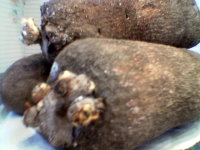Wild Yam
True Source of Natural Female Hormones

Wild yam is a type of yam usually found growing uncultivated in tropical wild forest. There are quite upwards of 150 varieties. Their popularity stems from their medicinal uses. Their tubers are usually smaller than the regular yam or 'true' yams and are often referred to as rhizomes rather than tubers.
Wild yams form part of the diet of the pygmies of tropical regions of the world, from central Africa to Latin America and the Philippines.
They were used as food. The most popular of these yams are the Mexican wild yams which include the following: Diascora barbasco, Diascorae villosa, Diascorae batatas, Diascorae floribunda and Diascorae composita.
They are also called colic – root, devils bones or rheumatism root.
Wild yam is a traditional African food, especially amongst the pygmies.
This variety of yam is mentioned here not necessarily as an African food, but because of its relationship to sweet yam in general. It is increasingly popular world wide because of its many medicinal uses.
Uses Of Wild Mexican Yam
Wild yam is used medicinally because of its high concentration of phyto-oestrogen and as a source of natural progesterone and other steroids.
The active ingredient of wild Mexican yam is a saponin called diosgenin. This agent after extraction from yam is converted to natural progesterone or dehydroepiandrosterone (DHEA).
This chemical conversion can not take place inside the body on its own.
These steroids helps to regulate smooth muscles, release of other types of hormones, division of cells on the surface of the uterus, and lots more.
It comes as wild Mexican yam cream, of which you could find various strengths. It is lipid based cream, and often applied over the skin, with excellent absorption rates.
The following are common uses of wild Mexican yam cream:
- Menstrual pain relieve
- Contraception
- Irregular or excessive periods (menstruation)
- Relieve of hot flushes in menopausal women
- Prevent and treat vaginal dryness in menopausal women
- Osteoporosis
- Protection against breast cancer, ovarian cancer, and endometrial cancer
- Prevent obesity
- Lower blood pressure
- Antispasmodic to prevent threatened abortion and intestinal colic in children
Want regular updates on African cuisines and food recipes? What about unique health information about these foods - what to eat and avoid to keep healthy from the list of African recipes available?
Fill in the form below to subscribe to our Newsletter - AfricanFoods Weekly?
Worried about spamming? We are too. We will never ever give or pass on your information to anyone else. We will only use your email address to send you your copy of our weekly newsletter. We do have a zero tolerance to spam. We subscribe to a very strict policy on the handling and use of information we gather on this site! We also get paid for affiliate links on this site. See our privacy policy for further details.
Follow us on social media:
Get Our Weekly Newsletter. Subscribe Today. It's FREE.
Subscribe to African Foods Weekly
Get African food recipes, cooking tips, and healthy eating info delivered to your inbox every week. Simply fill in your email below and click SUBSCRIBE .
(Your information will not be shared)










New! Comments
Have your say about what you just read! Leave me a comment in the box below.